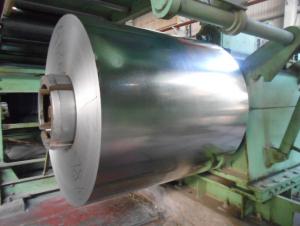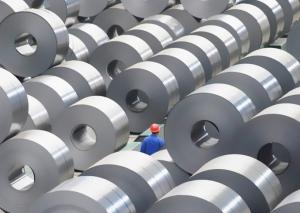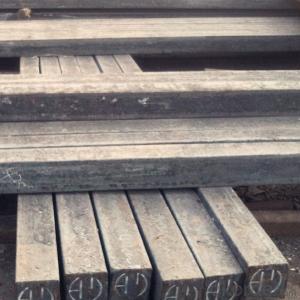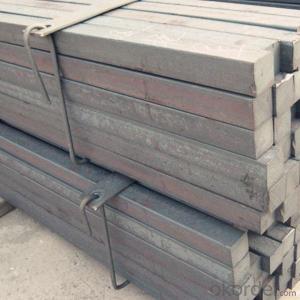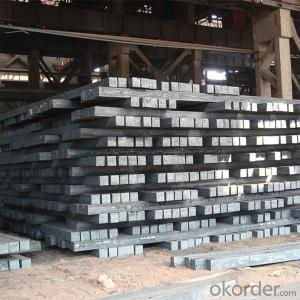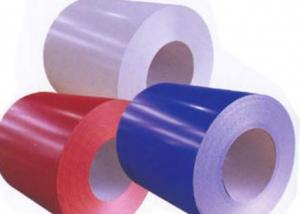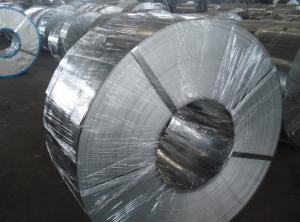Hot-dip Aluzinc Steel Building Roof Sheet in Coils of Prime Quality 0.29mm
- Loading Port:
- Tianjin
- Payment Terms:
- TT OR LC
- Min Order Qty:
- 50 m.t.
- Supply Capability:
- 20000 m.t./month
OKorder Service Pledge
OKorder Financial Service
You Might Also Like
1. Description of the Hot-dip Aluzinc Steel:
Hot-dip aluzinc steel structure is composed of aluminum-zinc alloy, consisting of 55% aluminum, 43% zinc and 2% at 600 ℃ silicon solidification temperature and composition, the entire structure is made of aluminum - iron - silicon - zinc, to form a dense quaternary crystals an alloy.
Hot-dip aluzinc steel has many excellent features: strong corrosion resistance, is three times the pure galvanized sheet; zinc surface with beautiful flowers, can be used as a building outside board.
Applications of hot-dip aluzinc steel:
1)Building: roof, walls, garages, soundproof walls, pipes and modular housing.
2)Automotive: muffler, exhaust pipes, wiper accessories, fuel tank, truck boxes, etc.
3)Appliances: refrigerator back, gas stove, air conditioners, microwave oven, LCD frame, 4)CRT-proof band, LED backlight, electrical cabinets, etc.
5)Farm: barn, sheds, silos, piping and other greenhouse.
6)Other: breaking heat insulation cover, heat exchangers, dryers, warm water, etc.
2.Main Features of the Hot-dip Aluzinc Steel:
• Excellent corrosion resistance
• High temperature oxidation resistance
• High hot reflectance
• Good manufacturability
•Beautiful appearance
•Surface coating
•Cost-effective
3.Hot-dip Aluzinc Steel Images
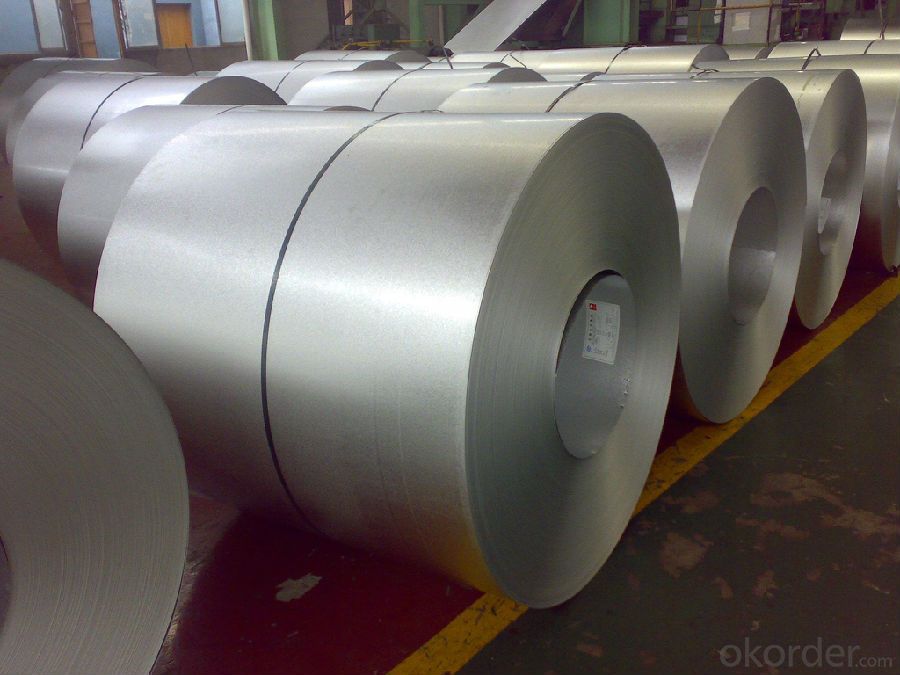
4.Hot-dip Aluzinc Steel Specification
AVAILABLE SPECIFICATION
HOT-DIP ALUZINC STEEL COILS | |
THICKNESS | 0.16mm-3.5mm |
WIDTH | 1250mm MAX |
COATING MASS | |
SPANGLE | Regular Spangle, Minimized Spangle, Zero Spangle |
SURFACE TREATMENT | Chromated / non-chromated, Oiled / non-oiled, Anti Finger Print |
COIL INNER DIAMETER | 508mm or 610mm |
HOT-DIP ALUZINC STEEL COILS | |||
COMMERCIAL QUALITY | ASTM A792M-06a | EN10327-2004 | JIS G 3321:2010 |
STRUCTURE STEEL | SS GRADE 230 SS GRADE 255 SS GRADE 275 SS GRADE 340 SS GRADE 550 | S250GD+AZ S280GD+AZ S550GD+AZ | SGLC440 SGLC490 SGLC570 |
2.5.FAQ of Hot-dip Aluzinc Steel
We have organized several common questions for our clients,may help you sincerely:
1.What advantages does your company have?
Cement : Annual capacity of 400 million tons, No. 1 in the world
Fiberglass: Annual capacity of 1 million tons fiberglass, No. 1 in the world.
Composite Materials — Carbon Fiber: Annual capacity of 10,000 tons PAN precursor and 4,000 tons carbon fiber, No. 1 in China
Composite Materials — Rotor Blade: Annual production capacity of 15,000 pieces, No.1 in China, Top3 worldwide
Glass: CNBM owns about 20 modern float glass product`ion lines, With annual capacity of 10 million square meters glass.
Light Weight Building Materials: Annual capacity of 1.65 billion square meters of gypsum board, No. 1 in the world.
Commercial concrete: Annual capacity of 0.35 billion cubic meters, No. 1 in the world.
Refractory Material: Annual capacity of 40,000 tons casting refractory, No.1 in the world.
2.What advantages do your products have?
Firstly, our base material is of high quality, Their performance is in smooth and flat surface,no edge wave ,good flexibility.
Secondly, high quality zinc ingoats, 97.5% zinc,1.5% silicon,1% others, the same zinc coating measured by metal coating thickness or by zinc weight
Thirdly, high precision: Tolerance strictly according to ASTM or JISG standard even more rigid.
We have full stes of testing equipment(for t best, cupule,chromatism,salt spray resistance, etc) and professional engineers.
3.Could you let me approach about your company in Dubai?
Located at Jebel Ali Free Zone in Dubai, CNBM Dubai Logistics Complex is adjacent to -Jebel Ali sea port-the largest port in UAE and Al Maktoum Airport-the largest airport in the world, which covers an area of 50,000 square meters, including an fully enclosed warehouse by 10,000 square meters, an open yard by 25000 square meters, and 13 standard unloading platform. CNBM Dubai Logistics Complex formally put into operation on August 1, 2013. Dubai Logistics Complex will commit itself to build the most professional and most influential building materials distribution center of China’s building materials industry in the UAE and throughout the Middle East and Africa.
- Q:How does steel pipe coating for oil pipelines work?
- Steel pipe coating for oil pipelines works by applying a protective layer on the exterior surface of the steel pipe to prevent corrosion and damage. The coating, typically made of epoxy, polyethylene, or polyurethane, creates a barrier between the pipe and the surrounding environment, preventing contact with moisture, chemicals, and other corrosive agents. This coating process involves surface preparation, which includes cleaning, blasting, and priming the pipe, followed by the application of the coating material through various methods like spraying or wrapping. The coating not only enhances the durability and lifespan of the pipeline but also ensures the safe transportation of oil by minimizing the risk of leaks and structural failures.
- Q:How is steel used in the production of HVAC systems?
- Steel is used in the production of HVAC systems for various components such as the ductwork, air handling units, and structural supports, due to its strength, durability, and resistance to heat and corrosion.
- Q:What are the different types of steel products used in the manufacturing of musical instruments?
- There are several types of steel products used in the manufacturing of musical instruments, including stainless steel, carbon steel, and nickel-plated steel. Stainless steel is often used for guitar strings due to its corrosion resistance and bright tone. Carbon steel is commonly used for piano strings, as it provides a rich and resonant sound. Nickel-plated steel is used for a variety of instrument components, such as flute keys and saxophone ligatures, as it offers durability and a smooth surface finish.
- Q:What are the advantages of using steel in high-rise buildings?
- There are several advantages of using steel in high-rise buildings. Firstly, steel is a strong and durable material that can withstand high wind loads and seismic forces, making it suitable for tall structures. Secondly, steel has a high strength-to-weight ratio, allowing for lighter building components and reducing the overall weight of the structure. This, in turn, reduces foundation requirements and construction costs. Additionally, steel is a versatile material that can be easily fabricated and assembled, allowing for efficient construction and faster project completion. Finally, steel is a sustainable option as it can be recycled and reused, minimizing environmental impact and promoting sustainability in the construction industry.
- Q:How is steel used in the construction of stadiums and sports facilities?
- Steel is used extensively in the construction of stadiums and sports facilities due to its strength, durability, and versatility. It is used to create the structural framework, support the roof, and provide the necessary stability for large seating areas. Additionally, steel is used to construct staircases, escalators, and elevators within the facilities. Its use allows for the creation of spacious and open designs, ensuring the safety and comfort of spectators while also accommodating various sports activities and events.
- Q:What is the role of steel in the manufacturing of appliances?
- The role of steel in the manufacturing of appliances is crucial as it provides strength, durability, and resistance to heat and corrosion. Steel is used in various components of appliances, such as the outer shells, frames, and internal structures, to ensure they can withstand the rigors of everyday use and maintain their integrity over time. Additionally, steel's malleability allows for the creation of complex shapes and designs, making it a versatile material for appliance manufacturing.
- Q:How is steel used in the production of fire-resistant materials?
- Steel is often used in the production of fire-resistant materials as it provides strength and structural support to these materials. Steel is used to reinforce walls, doors, and other components of fire-resistant structures, making them more resistant to the heat and flames of a fire. Additionally, steel can be used as a coating or cladding material to provide an extra layer of protection against fire.
- Q:What are the different types of steel pipes and their applications?
- There are several types of steel pipes, each designed for specific applications. Some common types include carbon steel pipes, stainless steel pipes, alloy steel pipes, and galvanized steel pipes. Carbon steel pipes are widely used in industries such as oil and gas, construction, and automotive due to their strength and affordability. Stainless steel pipes are corrosion-resistant and often used in industries such as food processing, pharmaceuticals, and chemical plants. Alloy steel pipes are made from a combination of different metals and are used in high-temperature and high-pressure applications such as power plants and refineries. Galvanized steel pipes are coated with zinc to protect against corrosion and are commonly used in plumbing and water supply systems. Overall, the choice of steel pipe depends on the specific needs and requirements of the application.
- Q:How is steel used in the production of tools and machinery?
- Steel is widely used in the production of tools and machinery due to its high strength and durability. It is commonly employed to manufacture various components, such as blades, gears, shafts, and frames, that require resistance to wear, deformation, and heavy loads. The hardness and toughness of steel make it ideal for cutting, drilling, and shaping materials. Additionally, its ability to be easily machined and welded allows for customization and assembly of complex machinery. Overall, steel's properties make it an essential material in the construction of tools and machinery, ensuring their reliability and efficiency.
- Q:What are the advantages of using steel in roofing materials?
- There are several advantages of using steel in roofing materials. Firstly, steel is a highly durable material that can withstand extreme weather conditions, such as strong winds, heavy rains, and even hailstorms. It is also resistant to fire, making it a safe choice for roofing. Additionally, steel roofs are known for their longevity, as they can last for several decades with minimal maintenance. Moreover, steel is lightweight, which makes it easier and more cost-effective to install. Lastly, steel roofs are environmentally friendly as they are often made from recycled materials and can be recycled themselves at the end of their lifespan.
1. Manufacturer Overview |
|
|---|---|
| Location | |
| Year Established | |
| Annual Output Value | |
| Main Markets | |
| Company Certifications | |
2. Manufacturer Certificates |
|
|---|---|
| a) Certification Name | |
| Range | |
| Reference | |
| Validity Period | |
3. Manufacturer Capability |
|
|---|---|
| a)Trade Capacity | |
| Nearest Port | |
| Export Percentage | |
| No.of Employees in Trade Department | |
| Language Spoken: | |
| b)Factory Information | |
| Factory Size: | |
| No. of Production Lines | |
| Contract Manufacturing | |
| Product Price Range | |
Send your message to us
Hot-dip Aluzinc Steel Building Roof Sheet in Coils of Prime Quality 0.29mm
- Loading Port:
- Tianjin
- Payment Terms:
- TT OR LC
- Min Order Qty:
- 50 m.t.
- Supply Capability:
- 20000 m.t./month
OKorder Service Pledge
OKorder Financial Service
Similar products
New products
Hot products
Hot Searches
Related keywords
